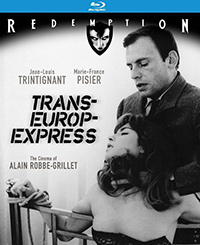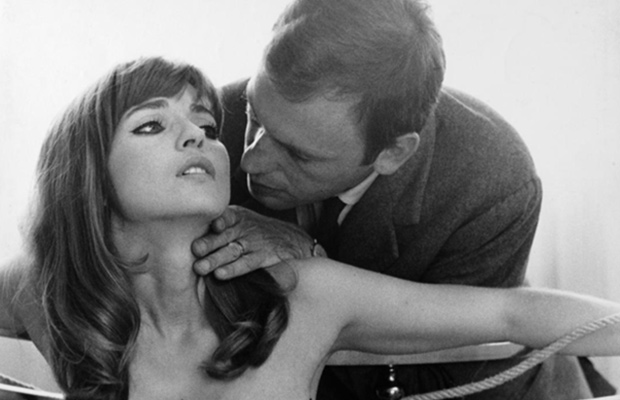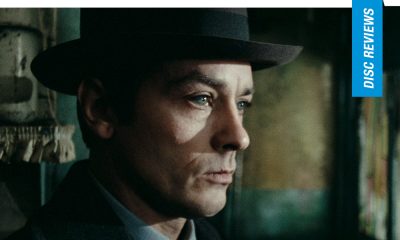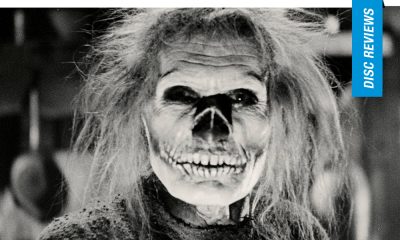Disc Reviews
The Cinema of Alain Robbe-Grillet | Blu-ray Review
Trans-Europ-Express (1967)
 Redemption films resurrects two long unavailable titles from director Alain Robbe-Grillet, a member of the Nouvelle Vague best known as the screenwriter for Last Year at Marienbad, the surrealist classic from Alain Resnais. As a director, Robbe-Grillet has a lesser known yet equally lucrative body of work, consisting of ten titles that seem to exist somewhere out in the frayed hinterlands of any sort of definable movement. Many of his titles will put you in mind of works by other filmmakers, but each title seems to walk the line between sweet dream and beautiful nightmare, defying notions of narrative and, often, logic. That said, his films don’t cater to popular tastes, and many of his titles as director seem to have floated into an oblivion, the exception being his 1983 fantasy/nightmare La Belle Captive, one of his few offerings available on DVD. Until now, that is. While the BFI studio in the UK will release a six film collection later this year, stateside we now have access to two delicious titles, his 1967 sophomore film, Trans-Europ-Express and 1974’s Successive Slidings of Pleasure.
Redemption films resurrects two long unavailable titles from director Alain Robbe-Grillet, a member of the Nouvelle Vague best known as the screenwriter for Last Year at Marienbad, the surrealist classic from Alain Resnais. As a director, Robbe-Grillet has a lesser known yet equally lucrative body of work, consisting of ten titles that seem to exist somewhere out in the frayed hinterlands of any sort of definable movement. Many of his titles will put you in mind of works by other filmmakers, but each title seems to walk the line between sweet dream and beautiful nightmare, defying notions of narrative and, often, logic. That said, his films don’t cater to popular tastes, and many of his titles as director seem to have floated into an oblivion, the exception being his 1983 fantasy/nightmare La Belle Captive, one of his few offerings available on DVD. Until now, that is. While the BFI studio in the UK will release a six film collection later this year, stateside we now have access to two delicious titles, his 1967 sophomore film, Trans-Europ-Express and 1974’s Successive Slidings of Pleasure.
With Trans-Europ-Express, Robbe-Grillet seems to be operating within the same parameters concerning redefining narrative as several of his contemporaries were also doing at the time and the film feels evocative of Godard. Of course, it doesn’t hurt that it’s headlined by two stars well associated with the movement, Jean-Louis Trintignant and Marie-France Pisier (best known for her involvement in title by Rivette and Truffaut, though later appearing in some excellent films by Techine and Zulawski), here looking just as beautiful and doe-eyed as Anna Karina. Basically, Robbe-Grillet seems to be giving us a playful parody of the New Wave crime films, here an exercise in self-referential homage and self-reflexivity. A director (Robbe-Grillet) is on a train from Paris to Antwerp, and two members of his creative team are determined to use the trip to hash out the plot of a new film they want to make. Using the train as inspiration for a plot involving drug smuggling in a suit-case with a secret compartment, the trio spy actor Jean-Louis Trintignant on the train and decide to craft their protagonist, Elias, after the actor. Only, Trintignant really seems to be in the middle of some similar kind of action, and we switch from the filmmakers’ to Trintignant’s attempts to deliver the goods while he makes sadomasochistic relations with a prostitute (Pisier) who may be working for a rival gang. As the film wears on, we’re unclear of who’s in control of the narrative.
Final Thoughts:
There’s a playful and enigmatic energy about Trans-Europ-Express that makes it feel like a rather breezy exercise, and the possibility of our main characters existing as figments of sketches, not fully fleshed out yet by their own creators (or are they real people jogging the unconscious of those in charge?) tends to make us feel a bit distanced from them. Instead, we’re focused on trying to tail Robbe-Grillet’s elaborate puzzle. More arresting is Robbe-Grillet’s depiction of sexuality, namely the sadomasochism that seems to soak up Trintignant’s spare time, from girly mags to the hiring of Pisier’s Eva. Discussing the guidelines of what will be their first encounter, Eva’s inquiry into his interests results in his blunt response, “Rape. Only rape,” to which she informs him, without missing a beat, that that will cost more
Film Review: ★★★½/☆☆☆☆☆
Disc Review: ★★★/☆☆☆☆☆
Successive Slidings of Pleasure (1974)
If Tran-Europ-Express seems sexually progressive for an entry in the New Wave, 1974’s Successive Slidings of Pleasure has all the earmarks of the time period’s most famous Euro-sleaze art house titles and it feels more along the lines of something you’d expect to see from Jean Rollin or even Jesus Franco, though with higher production value (fans of either of those directors may be a tad disappointed with Robbe-Grillet, who isn’t quite as perverse as either of them). Here we have another nightmare fantasy, though even more elliptical in its narrative, an exploration of Robbe-Grillet’s favorite fetishes, like a sexy shoe that keeps popping up everywhere, and broken glass. There is a nude sequence involving an unconfirmed red liquid and eggs that is both striking to behold and somewhat repulsive, Robbe-Grillet utilizing raw eggs like Georges Bataille used hard boiled.
Jean-Louis Trintignant once again returns to star, but don’t be misled by the glossy new DVD cover which sports his name alongside Michael Lonsdale. Both notable stars show up here, but in very minor supporting roles. And yes, the one and only Isabelle Huppert makes an appearance in a role so small, if you blink you’ll miss it. Instead, the film is dominated by Anicee Alvina and Olga Georges-Picot (Love and Death, The Day of the Jackal).
A strange and imaginative young woman (Alvina) likes to make her beautiful and older roommate Nora (Georges-Picot) pose in strange and titillating fashions so that she can paint her. However, Nora is unexpectedly murdered one day, a pair of scissors plunged into her chest, and a judge (Lonsdale) and detective (Trintignant) are sure that the young woman is responsible, even though she won’t admit to it. And, oh yeah, they think she might be a witch. Imprisoned in a convent, she proceeds to seduce the priest (Jean Martin) and titillate all the nuns with her sexy full body painting, where she re-creates Yves Klein’s Anthropometries with red (rather than blue) paint. As she explains herself to her captors, we dissolve freely into flashback and trance-like dreams that culminates in a finale that feeds into its incessant repetitive nature.
Final Thoughts:
Successive Slidings of Pleasure is an arresting looking feature, Robbe-Grillet utilizing Yves Lafaye’s dreamy compositions that generally find us in glaring white rooms or cubby-hole dungeon proximity with our repressed characters. Verging on nunsploitation with its generous side of soft core lesbian sex (Georges-Picot also turns up also as the lawyer hired to defend the accused witch-murderer and promptly finds herself also attracted to her ward as well as a lusty nun), the film is also aggravatingly opaque. With doubling techniques and hysterical challenges to repressed sexualities that will undoubtedly attract fans of early De Palma, it’s a definite title worth seeking out, though the actress portraying the uber seductive vixen often seems like a vacuous vessel of bizarre details rather than an arresting screen presence. With the Huppert cameo, one can’t help but think what a great slice of early perversity for the actress that this title could have been had she been cast as the lead.
Film Review: ★★★/☆☆☆☆☆
Disc Review: ★★★/☆☆☆☆☆
Disc Review:
Both titles, nicely remastered in HD from original 35mm elements, are a definite treat for cineastes and certainly worth taking a look at (particularly Trans-Europ-Express). While each disc contains three trailers for Robbe-Grillet titles, the sole interesting extra feature on each disc is a half hour interview with Robbe-Grillet concerning the specific film at hand. As the director of such intriguing, offbeat cinema, it’s certainly worth hearing Robbe-Grillet talk about his titles several decades later, each reflective of different periods of cinema at large.
Los Angeles based Nicholas Bell is IONCINEMA.com's Chief Film Critic and covers film festivals such as Sundance, Berlin, Cannes and TIFF. He is part of the critic groups on Rotten Tomatoes, The Los Angeles Film Critics Association (LAFCA), the Online Film Critics Society (OFCS) and GALECA. His top 3 for 2021: France (Bruno Dumont), Passing (Rebecca Hall) and Nightmare Alley (Guillermo Del Toro). He was a jury member at the 2019 Cleveland International Film Festival.



































